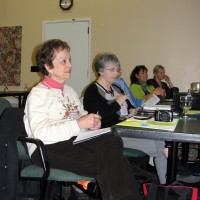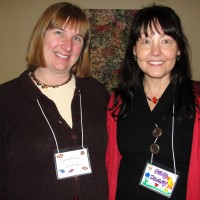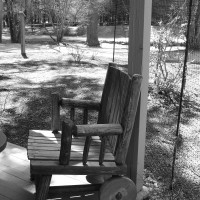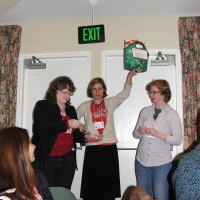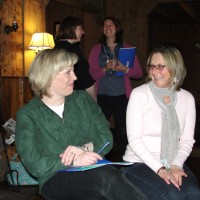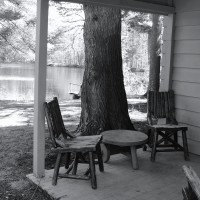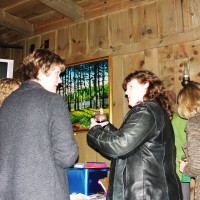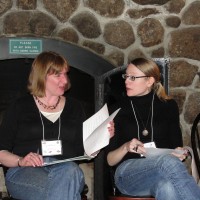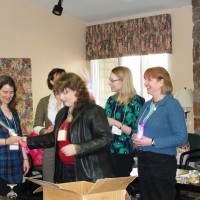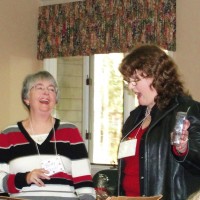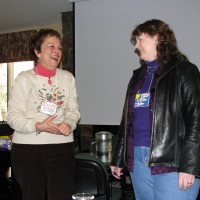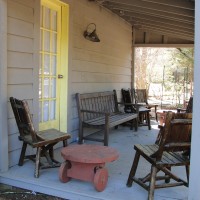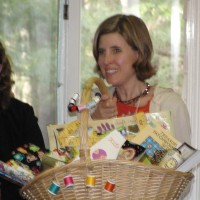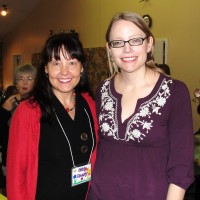 My return from North Carolina coincides with the beginning of spring in New England. After missing my first flight, I wind up taking a later one. Much later. My arrival home is well after midnight, when I am too weary for words. In the dark, I drag my suitcase across the driveway, up five steps, and then retire to bed, in hopes of escaping my nagging thoughts. Remembering what I was unable to accomplish while visiting my parents makes sleep difficult, but I arise early, and in the daylight, I happily discover that some of NC has made its way back to Connecticut. Bulbs have begun to break through the earth in search of the warm sun. Hope, for me, has returned.
My return from North Carolina coincides with the beginning of spring in New England. After missing my first flight, I wind up taking a later one. Much later. My arrival home is well after midnight, when I am too weary for words. In the dark, I drag my suitcase across the driveway, up five steps, and then retire to bed, in hopes of escaping my nagging thoughts. Remembering what I was unable to accomplish while visiting my parents makes sleep difficult, but I arise early, and in the daylight, I happily discover that some of NC has made its way back to Connecticut. Bulbs have begun to break through the earth in search of the warm sun. Hope, for me, has returned.
I let the sight of the blue iris and purple crocuses soak in, and then I begin to tackle the fall leaves that have provided a blanket of warmth and protection for my flowerbeds. I rake, pull weeds, and then head inside to make a few phone calls to the medical staff at UNC. Back in the sunshine, I smell the flowers, and throw balls for Merlin, our sheltie, to catch, my cell phone nearby.
 Yet, I am desperate to do more. I want to fix our broken health care system and keep Medicare and Medicaid from dwindling down to nothing. I want to cure any and all diseases that inflict suffering. But I can’t, and it makes me feel helpless at times. Helpless to those I love and know, including customers I’ve met at the toy store where I work, strangers I’ve spoken to in passing, and people I’ve read about.
Yet, I am desperate to do more. I want to fix our broken health care system and keep Medicare and Medicaid from dwindling down to nothing. I want to cure any and all diseases that inflict suffering. But I can’t, and it makes me feel helpless at times. Helpless to those I love and know, including customers I’ve met at the toy store where I work, strangers I’ve spoken to in passing, and people I’ve read about.
I sit on our front stoop, throw another ball across the yard for Merlin, and wonder if anything I do matters enough, especially in the face of everything else the elderly have to contend with. I want to scream, but instead I focus on the small acts of kindness.
Small acts of kindness do matter. They matter very much. They can be as simple as a hug or listening to a person tell a story, much needing to be told, or greeting a stranger, who appears to be suffering, to ask how they are doing. Let them know that someone cares.
 Life has its ups and downs; joys and tragedies; failures and triumphs. Don’t let that stop you from doing the small things, as my father reminded me just last week. Even when the situation resembles a solid brick wall and seems so insurmountable that you’d rather hide under the covers all day, think about chipping at the wall. Little by little. These are the ways you can empower your characters when they are facing their own brick wall. Do not bring in a bulldozer to knock down the wall for your character. Give them small actions to do, and then, as a writer, stand aside and let them be. The character must figure it out on their own.
Life has its ups and downs; joys and tragedies; failures and triumphs. Don’t let that stop you from doing the small things, as my father reminded me just last week. Even when the situation resembles a solid brick wall and seems so insurmountable that you’d rather hide under the covers all day, think about chipping at the wall. Little by little. These are the ways you can empower your characters when they are facing their own brick wall. Do not bring in a bulldozer to knock down the wall for your character. Give them small actions to do, and then, as a writer, stand aside and let them be. The character must figure it out on their own.
Though I wanted to bring in a bulldozer to help my father, instead, I focused on cheering him on, so he could do what he needed most: return home to write. Writing is what keeps his heart beating, his soul singing, his mind marching forward. He, in turn, wanted to help me, knowing I had set aside my writing to be with him and my mother. Through humor, my father—a lifetime writer—gave me a gift. He reminded me that a novel—especially one written for children—must have elements of hope, places where the reader can catch their breath and scenes that enforce humor.
 While my father did not exactly use those words, that is what he was trying to show me through his actions, using a real-life situation. Essentially, he planted the seeds to burn in my belly, so I would yearn to write again. Write about hope and hopelessness, all layered with humor.
While my father did not exactly use those words, that is what he was trying to show me through his actions, using a real-life situation. Essentially, he planted the seeds to burn in my belly, so I would yearn to write again. Write about hope and hopelessness, all layered with humor.
I realized this later on the plane ride home, when I found myself spontaneously smiling, and then bursting into laughter over Skittles. The ache in my belly returned and while people dozed on either side on me, I picked up a pen and let it lead me home, words spilling across the paper, faster than the speed of the plane.
Thank you, Dad, for this:
I arrive at the after-care facility to check my father out for the evening. Tired of the bland meals he had been eating for the past two weeks, he wants real food. I find him waiting in the front living area, looking tired and weak, but still able to entertain the other patients in the near vicinity. After greeting the three women seated near my father, I help him out of his chair.
“You need to check him out,” says a woman with a gruff voice, pointing her cane at me and my father, who is now grasping the walker, afraid to let go.
“I do?” I ask.
“Yes, otherwise they’ll think he’s run off.”
Clearly, he is not capable of running off.
“Oh, Lord, they’ll come looking for me. They’ll send the police and—”
“Dad, I got it. I’ll run upstairs and take care of this.” I seat him back down and leave him to tell more jokes, all of which I’ve heard a number of times.
Upstairs, the nurses’ station is unoccupied. I walk up and down the halls. Bells are going off in two rooms. People are moaning. I want to leave now. Then I spot two elderly women, both in wheelchairs, voicing their opinions.
“That woman is so dang bossy. Likes to think she runs the place.”
“Uh-huh.”
“’Cause of her, I’ve been waiting and waiting for my medicine, and they were supposed to bring me some more Jello. Red Jello. I hate that green stuff.”
“The man in #304 is hoarding Jello in his room. I seen it.”
“He is? Maybe I should wheel down there and pay him a visit. Man weighs a ton. Don’t need more Jello. I’m the one who needs it. I am gonna starve to death staying in this place.”
I tap the shoulder of the main talker. She spins around to face me. I smile. “Excuse me, but do you know where I might find a nurse on this floor?”
“Why you need a nurse? You can walk.”
“Well, I need to sign my dad out for the evening, so I can take him out to dinner.”
The Talker’s eyes light up. “You got a car?”
“Yes.”
She nudges her friend’s elbow. “You got room in your car for two more?”
“. . . Not really,” I say and picture my car loaded with two walkers, my luggage, one wheelchair, and my parents. The only room left is on the roof.
“Where you taking him?”
“I don’t know yet. I need to sign him out first.”
“Who’s your dad?”
Unsure of what room my father is in, I pray it isn’t #304, even though their description of the man didn’t fit my father. I tell them his name and wait.
“Oh, yeah . . . Mr. Devany, I know him. He’s a hard worker. Wants to get out of here real bad. Shows off in the exercise room.”
“That’s a nice surprise,” I say.
“Uh-huh, they say if I can walk like him and get out of this wheelchair, then I can leave too.”
I turn back to search for the nurse. Nothing.
“I bet you’re strong enough to get out of the wheelchair. Just keep trying. Keep believing you can do it,” I tell her.
“Thank you, young lady, for believing in me. I will keep trying.”
“You’re welcome,” I say, nodding. “Do you know when the nurse might return?”
The Talker again bumps elbows with her friend. They laugh at some inside joke.
“You’ll be waiting all night for her, I reckon,” offers the Talker.
Ten minutes have passed since I left my father downstairs. I head back to the nurses’ station, desperate to find the log-out sheet. The two women wheel behind me, while one shouts, “Just sign any ole paper and leave it there.”
“Are you allowed to do that?” I ask, tentatively.
“Hell, no, but we’ll vouch for you.”
I find a pile of papers citing the activities for the week. I turn to the backside and scribble a note, noting the time of the departure and expected return.
Then I run downstairs to break my dad out of the place, walker and all.
“Hurry, Dad, we have to go. Now!”
“I can’t go. I need a dollar. Two dollars.”
“What for? We’re running late. Mom is waiting in the car.”
He clutches the walker and pushes it toward the front desk. “See that red box there? The store has been out of them for a week; my supply is nearly gone. I eat one an hour. I’ll never make it through the night.”
I have been in NC for less than two hours and I am already facing an unforeseen challenge. I follow him to the desk and ask the young clerk for assistance.
“Skittles. Mr. Devany loves Skittles.” She points above her head to a red box filled with the candies. “We just got them in today, along with the Reese’s Pieces.
“Oh, Lord, they got Reese’s in too? Now I need three dollars.”
“Dad, we have to go.”
“I can’t leave until I get my candies. They’ll be gone by the time I come back.”
Out the door, down the ramp we go. Step by step, inch by inch. All the while, I hear about the Skittles and the Reese’s Pieces, and then, how the care facility lacks French Fries and cheese biscuits. We finally make it to the car.
“I don’t think I can get in the car, I’m too weak . . . just thinking about running out of Skittles.” He leans against the car and feigns panting.
“Fine,” I’ll get your Skittles, but you have to get in the car first.”
Ten minutes later, he is seated and buckled in; I fold the walker and place it next to my mother’s. After I find a five-dollar bill in my purse, I head for the ramp.
“Don’t forget: One Skittles. Two of those Reese’s things.”
Candies safely secured in the car, we head for real food. I forget that it is a Saturday night. The restaurants are all crowded. The search for cheese biscuits is unsuccessful. Red Lobster has a one-hour wait. I park the car; check the waiting time at other restaurants: Longhorn Steakhouse, Chili’s, Ruby Tuesdays. All one-hour waits, if not longer.
Back in the car, I lean my head against the steering wheel and groan.
“It’s kind of late. I need to eat soon so I can take my medicines. Did the nurse give them to you?” my dad says.
“I didn’t talk to the nurse, Dad. No one was there.”
“Oh, Lord, you didn’t sign me out?”
“No, Dad, I left a note with two women in wheelchairs.”
“Oh, no, that had to be Miss Eula and Bessie. They will be in my room, right now, stealing my Skittles.”
I assure my father that his new package of Skittles is safe in my car, though I can’t attest to the honesty of Miss Eula and Bessie. A loss of three pieces of Skittles is small change in the scope of things.
Finally, I find a deli. One I am familiar with, and which has easy access. I open the car doors. Take out the two walkers. Unfold them. Set one up in front of each parent.
“You gave me the wrong walker,” says my mom. “Mine has the tennis balls for feet.”
I swap the walkers, and then, like a cheerleader, I root for my dad to rise up and out of the car seat. He does, followed by my mother. Creeping along, we make our way into McAllister’s Deli. Ten minutes pass. We find a table. My parents sit. I grab three menus from the front counter and bring them back to our table. For the moment, life is good . . . until my dad reads over the menu.
“Where are the French Fries? I don’t see French Fries listed,” he says.
I consider the arithmetic, and then share the math with my father. “Dad, I am one person helping two people, both on walkers, and we are all starving. All the other restaurants have long waiting times and it is currently 9 p.m. Do you know what that equals?”
“No French Fries?” he says.
“Bingo,” I say and hand him a bag of chips.
P.S.- Dad, I love you, oodles and boodles and spaghetti galore. I can feel you writing across the miles. Know that I am too. XO
P.P.S – Miss Eula, keep believing. You can do it! One step at a time.
The link for this week’s Free Fall Friday is http://kathytemean.wordpress.com/2011/03/25/free-fall-friday-13/
 I am still reeling from this past weekend: a glorious three days spent with writers, illustrators, and professionals in the field of children’s literature. The NE SCBWI conference was a thorough success, and not just in my opinion.
I am still reeling from this past weekend: a glorious three days spent with writers, illustrators, and professionals in the field of children’s literature. The NE SCBWI conference was a thorough success, and not just in my opinion.  Richard Michelson had us on the edge of our seats with the story of how he became a prizewinning poet and children’s book author. I plan to visit the R. Michelson Galleries located in Northampton, Massachusetts. You should too. His speech surprised me at times, but went right to the heart. Good writing at its best.
Richard Michelson had us on the edge of our seats with the story of how he became a prizewinning poet and children’s book author. I plan to visit the R. Michelson Galleries located in Northampton, Massachusetts. You should too. His speech surprised me at times, but went right to the heart. Good writing at its best. Like Whispering Pines, I plan to break up my posts on the conference, partly because I am bogged down with preparations for the upcoming New Jersey SCBWI conference. I am a committee member and volunteer, and I have lots to do before I head down Interstate 95 for Princeton, New Jersey. (For those attending the conference, I look forward to seeing you. Please seek me out to say hi if we haven’t met before!)
Like Whispering Pines, I plan to break up my posts on the conference, partly because I am bogged down with preparations for the upcoming New Jersey SCBWI conference. I am a committee member and volunteer, and I have lots to do before I head down Interstate 95 for Princeton, New Jersey. (For those attending the conference, I look forward to seeing you. Please seek me out to say hi if we haven’t met before!) I am eternally grateful to the Ruth Landers Glass Scholarship committee for choosing my middle grade novel, Savannah’s Mountain, to be this year’s recipient of the award. I humbly join the list of past winners, and I promise to honor, more than ever, my commitment to writing quality children’s literature. My congratulations to all the illustrators who won at this year’s conference.
I am eternally grateful to the Ruth Landers Glass Scholarship committee for choosing my middle grade novel, Savannah’s Mountain, to be this year’s recipient of the award. I humbly join the list of past winners, and I promise to honor, more than ever, my commitment to writing quality children’s literature. My congratulations to all the illustrators who won at this year’s conference. Community. Let the word roll off your tongue. Feel its power, it’s undying support. In the business of writing for children, we are fortunate to be a loving and sustaining community—unlike so many other professions where greed and jealousy prevail. Writing and illustrating is a solitary experience. But we are not alone. We are in this together, supporting one another, cheering one another, and encouraging our peers. Yet, we must honor the necessary process of being by ourselves. We must close the door and find that place, which takes us out on a limb, alone. Sometimes scared, but hopefully always driven to create. To create the very best that we can.
Community. Let the word roll off your tongue. Feel its power, it’s undying support. In the business of writing for children, we are fortunate to be a loving and sustaining community—unlike so many other professions where greed and jealousy prevail. Writing and illustrating is a solitary experience. But we are not alone. We are in this together, supporting one another, cheering one another, and encouraging our peers. Yet, we must honor the necessary process of being by ourselves. We must close the door and find that place, which takes us out on a limb, alone. Sometimes scared, but hopefully always driven to create. To create the very best that we can. Keep that sense of community before you escape to the work that only you can write. Then turn off the phone, the internet, the fighting desire to sink your bottom into the couch and flit from site to site, from Face book to Amazon ratings, to anywhere else because you fear the empty page.
Keep that sense of community before you escape to the work that only you can write. Then turn off the phone, the internet, the fighting desire to sink your bottom into the couch and flit from site to site, from Face book to Amazon ratings, to anywhere else because you fear the empty page.




























![IMAG0253[1]](http://ecngx256.inmotionhosting.com/~betsyd5/wp-content/uploads/2011/04/imag02531.jpg?w=179)






![IMAG0247[1]](http://ecngx256.inmotionhosting.com/~betsyd5/wp-content/uploads/2011/04/imag02471-1.jpg?w=179)
![IMAG0252[1]](http://ecngx256.inmotionhosting.com/~betsyd5/wp-content/uploads/2011/04/imag02521-1.jpg?w=179)













